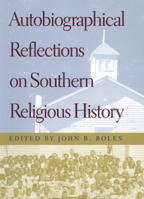

 |
John B. Boles, editor. Autobiographical Reflections on Southern Religious History. Athens: University of Georgia Press, 2001. 272 pages. ISBN: 0820322970. Reviewed by Fred Hobson, for the Journal of Southern Religion.
It has always seemed to me that much scholarship, including some of the best of it, is a sort of spiritual autobiography, the working out of personal concerns through scholarly inquiry. Such might especially be the case with scholarship on the American South, particularly for those who grew up southern and who wanted to know why the land they inhabited – the site of everyday existence, but also spectacle, almost larger than life – was as it was. Such might the case even more for those who have investigated the heart and soul of Dixie, those historians of the religion of the South.
All this is to say that what John Boles has done in this volume is valuable indeed: he has asked many of the leading historians of southern religion to write essays in which they explain why they were attracted to their subjects in the first place. Included are Samuel S. Hill, Donald G. Mathews, Wayne Flynt, Charles Reagan Wilson, John Shelton Reed and others who have added a great deal to our knowledge of what and how southerners worship. Boles has brought together a representative body. By my count we have here four historians who grew up – or early became – Baptist, one Methodist, one Presbyterian, two Lutheran, two Church of Christ, three Roman Catholic (all born outside Dixie), one Episcopalian, and one Jewish. The small number of Methodists and Presbyterians somewhat surprises me, especially given the emphasis on education (Duke, Vanderbilt, and Emory were all originally Methodist) and social action of both denominations. But no one can say there isn't a broad representation of southern society here.
"What also surprises me somewhat is the number of these essayists (seven out of sixteen) who attended seminary and, at least for a time, were preachers" |
What also surprises me somewhat is the number of these essayists (seven out of sixteen) who attended seminary and, at least for a time, were preachers – which contributes even more to my belief that that their scholarship has been, in many cases, far more than dispassionate academic inquiry. Many of them, as one might expect of those who are essentially moralists, were attracted to an examination of the South's great moral dilemma – race. All of the essayists but one are white (all except two are men), and almost all either grew up relatively moderate on race or underwent racial conversions. That in itself makes a telling comment: in a region in which, in general, the white church operated as a reactionary force, fighting racial change all the way, those who immersed themselves most deeply in religion (in all but one case, in Christianity), those who not only believed it but studied it, came out on the other side, the side of racial integration and cooperation.
Others of the essayists are drawn to other aspects of the southern mind, or soul: Flynt writes engagingly of the politics of class among the Baptists of Anniston, Alabama. Reed writes of growing up Episcopalian in the low-church hill country of East Tennessee, Samuel Hill of his pathway from the Baptist ministry to the classroom (and also to the Episcopal Church: although only one of these essayists was born Episcopalian, two or three others wound up there), Boles of his journey from rural, evangelical East Texas ("I was about as country as one could be") to Rice University and an early attempt to be "a kind of poor man's Perry Miller of the South." Wilson writes of his movement from Tennessee to Texas to Mississippi, from the Church of Christ to Episcopalianism, all the while cultivating his interest in the civil religion of the South, and David Edwin Harrell, Jr., of the development of his scholarly interest in Pentecostalism and the charismatic movement. The most intriguing reason for coming to write about religion in the South is given by Mathews: "I realized that it was because my grandfather had been lynched." That grandfather, during a period of racial violence in Oklahoma in the early twentieth century, had protected a black family in his home; for that act he had been beaten within an inch of his life ("lynched," Mathews argues, just as surely as if he had died), and the consequences of that action, and what it said about right and wrong, cowardice and courage, affected Matthews long afterward.
One lesson we have learned about scholarship, historical or literary or otherwise, over the past few decades, is that a human being – with experiences, beliefs, a point of view – lies behind the written work. In the essays in this volume we see something of the making of the scholars who produced landmark studies in southern religious history: Hill's Southern Churches in Crisis (1966), Mathews' Religion in the Old South (1977), Boles' own The Great Revival, 1787-1805: The Origins of the Southern Evangelical Mind (1972). Boles' collection is itself a valuable contribution to the study of southern religious history; in fact, one might think of doing the same thing – exploring the origins of academic interest and commitment – for a number of other disciplines as well.
Fred Hobson, University of North Carolina at Chapel Hill
© 1998-2004 by The Journal of Southern Religion. All rights reserved. ISSN 1094-5234